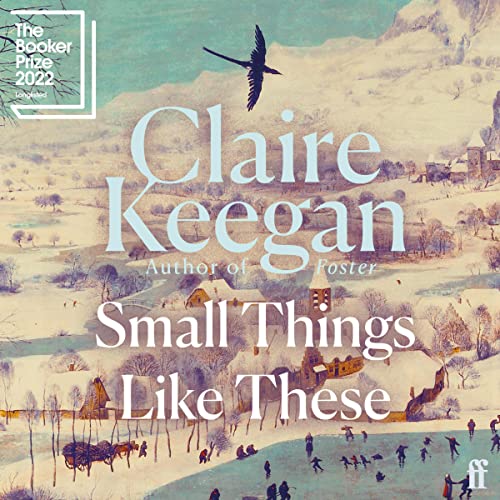Emma reviews Claire Keegan’s Booker Prize shortlisted Small Things Like These, a novella about one father’s encounter with one of Ireland’s infamous Magdalene laundries.
Bill Furlong is a coal and timber merchant in Claire Keegan’s Small Things Like These. But his profession is not the only thing that has him “consigned to doorways…standing outside one or another, waiting for them to be opened”. As the Christmas of 1985 approaches, Keegan has constructed a landscape of small-town life in Ireland that sees this hardworking family-man struggle to find his place both at home and in his community.
This tale has been highly lauded by a wide range of critics, the most memorable being the Sunday Times dubbing it “a snow globe of a story”. What a wonderful image to encapsulate this neat little novella!
Deceptively plain, the subtlety of Furlong’s journey towards self-realisation could be mistaken as underwhelming on a cursory read. However, a closer, slower inspection unmasks Keegan’s layering of quiet spaces leaving a lingering rawness and beauty that resonated strongly with me. Bill Furlong is something of a kindred spirit.
I say this not without some discomfort and shame.
Furlong’s struggle to inhabit the present is one I share. His absorption with lists, self-checking, the unending burden of work which is almost longed for as a kind of palliative to the present – all these sentiments are uncomfortably familiar.
Indeed, upon reading of Furlong’s inaction and silence regarding Sarah Redmond, I was prompted to recall a comparable episode when I was given the opportunity to help someone else yet could only think of how to get out of the situation and return to the earlier, uncomplicated moment before being inconvenienced. I too felt a haunting, that spectre of responsibility merely due to the happenstance of space and time.
To stare at our sins of omission directly and face them for what they are, this is a sobering thing. The taint touches us time and time again. To look at ourselves through such a lens could incapacitate. But attention to our unwitting complicity in the hidden suffering of others is a two-way looking glass. Perhaps this is precisely what we must do in order to break out of the inert numbness that comes with comfort. As Furlong himself realised, “learning how to manage and balance the give-and-take in a way that let you get on with others as well as your own…was [a] privileged…thought”. Without such jarring discomfort we are in danger of missing the very thing that will jolt us into really living in that truly life-giving way.
Perhaps it’s a shared stage of life, the monotony of the middle years. I don’t know. But I found myself championing his small defiances. That fear-fuelled yet liberating walk would allow him to, in Furlong’s own words, “call [him]self a Christian, and face [him]self in the mirror”, fully aware of the consequences of his choices. To witness this boldness and courage, when we have been privy to his private struggles and vulnerabilities, elevates small things like these to aspirational actions.
To return to the Sunday Times’ endorsement of this tale, the scene set on display is one to be lifted up and lingered over. And, when the particles settle, it provides a land-in-miniature in which we can see ourselves.

